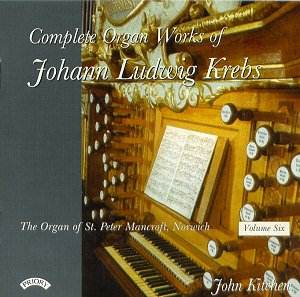The booklet cover of this the sixth and last
CD in the series of Krebs organ music has a picture of the double
manual organ complete with its approximately 32 stops at the Schlosskirche
in Altenburg Castle. The same picture is used for Volume three
of this series (PRCD 736). The reason for the organ being so prominent
is that this was the instrument, although not featured in this
series, which Krebs played and before him his teacher J.S. Bach
(in 1739) when he was appointed to the court of Prince Gotha-Altenburg
in 1755. The organ is still in use though only after considerable
restoration work. Its design and specification give us a clue
as to which modern instruments might suit Krebs’ own works. This
series of CDs has moved around Europe in an attempt to find them.
John Kitchen who has performed and recorded all
eight hours or so of Krebs’ works and who writes the very clear
and readable booklet notes tells us that the Collins organ at
St.Peter Mancroft "owes much to the north German tradition".
He then gives us the specification of this three manual organ
followed usefully by the registration used for each piece on the
disc. I only wish that this were common practice. There is no
32 foot which would have been very much in character but there
is a tremulant which, mercifully, is not used.
Krebs was a favourite pupil of J.S., who described
him as having "distinguished himself in the art of music".
Only fleetingly in this volume do we see quite what J.S. saw in
him. I’m sorry to have to admit that the other five volumes have
not come my way nevertheless let’s start with the best pieces.
Amongst these I would place the Praeludium and
Fuga in C minor which runs to over 12 minutes. The fugue is a
double fugue i.e., with two subjects which triumphantly join together
in the closing passage. Krebs’ contrapuntal skill is nowhere better
displayed than here. The disc includes three other short fugues
at the end which in consequence seem almost to be like student
exercises. Equally fine is a Trio in E minor in three linked movements
each of which is separately tracked. The central allegro recalls
Bach’s 1st Organ trio which was presumably a model.
Another trio on this disc is in just a single movement; another
consists of two Andantes.
The disc includes various Chorale preludes including
a fine one on ‘Jesu mein Freude’ and some pieces from the ‘Clavierübung’,
Krebs’ only publication of 1752-3. These consist of a selection
of chorales in manuals-only arrangements; almost certainly intended
for liturgical use. Each consists of three sections, an opening
Praeludium which sets the mood and hints at the chorale melody;
a central movement in which a statement of that melody is accompanied
by manual figuration; and a final ‘choral alio modo’. Again each
is separately tracked. The disc offers two examples although neither
of these modest pieces runs to more than three minutes in all.
There is also a short free Fantasia which stands alone and a Fantasia
on a Chorale melody ‘Heut triumphiret Gottes sohn’ which is so
out of character in the eccentricity of its melodic writing that
it is probably by C.P.E. Bach.
I have to end by saying that this disc is probably
only for organ buffs and/or organists who are completists. Nevertheless
it is interesting to see how J.S. Bach’s mantle was carried on
well into the time of Mozart.
Recording and general presentation of the disc
is exemplary and John Kitchen is an ideal and expert advocate
of this little known repertoire.
Gary Higginson
